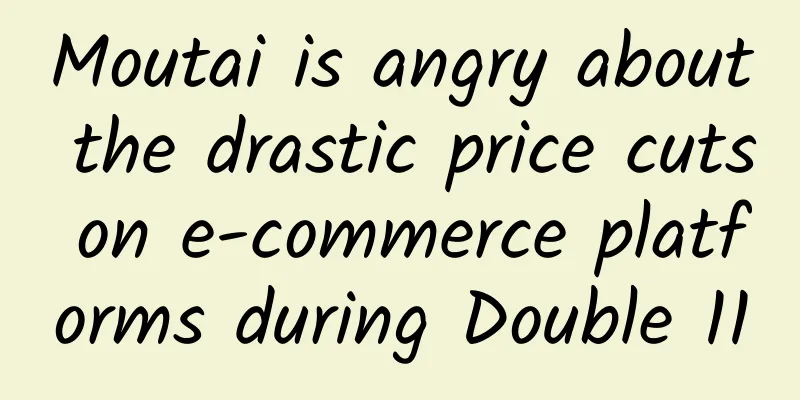Moutai is angry about the drastic price cuts on e-commerce platforms during Double 11

|
The battle between traditional wine companies and e-commerce companies caused by the low-price marketing on "Double 11" is escalating. Yesterday, high-end wine companies including Moutai and Langjiu issued announcements, once again clarifying that they have no cooperative relationship with many e-commerce companies. Moutai even stated that it is legally protecting its rights through relevant departments against low-price dumping. Some analysts believe that the pressure on wine companies’ operations and damage to their brands may be the main reason why they are more opposed this year. In this regard, some in the industry strongly support the wine companies, saying that low prices damage the brand, while others believe that the wine companies should go with the flow and find a way out for wine e-commerce from the "Double 11" carnival. Wine companies flock to cut ties with e-commerce Yesterday, a Beijing Business Daily reporter learned from the Sichuan Province Liquor Circulation Association that in response to "Double 11", the association recently held a joint meeting with major wineries. Yesterday, Moutai, Langjiu and other liquor companies issued announcements to cut ties with many e-commerce companies. Jiannanchun and Langjiu both said in their announcements that 1919 official flagship store, wine shopping network and other e-commerce platforms had no business cooperation with them in 2014. They also said that they had no idea about their purchase channels, and "if there is any infringement of intellectual property rights, they will protect their rights according to law." Moutai, the leading liquor brand, regards discount sales by e-commerce companies as “dumping”. It has made it clear that it has no direct cooperation with many e-commerce companies and said, “Recently, some e-commerce platforms have sold Kweichow Moutai liquor at a price lower than the ex-factory price. We are legally protecting our rights through relevant departments against the low-price dumping behavior of some e-commerce platforms.” An insider revealed that more liquor companies may join the “rights protection” team in the future. In fact, not only wine companies, but also industry associations are quite dissatisfied with the behavior of e-commerce. The relevant person in charge of the China Alcoholic Beverage Circulation Association said in an interview with a Beijing Business Daily reporter that the discount promotions of e-commerce are "harmful to others and not beneficial to oneself", "causing serious damage to the market order of our liquor industry and damaging the interests of enterprises. For the e-commerce itself, it loses profits or even money. If there is fake wine in the goods, it is also a damage to its e-commerce brand." In addition, the person in charge suspected that such low-priced wines came from unknown sources. However, several e-commerce executives interviewed by Beijing Business Daily yesterday said that they confirmed that their goods were purchased through regular channels and were genuine. "Our purchase price is relatively low, so it is worth sacrificing some profits to gain traffic and build an e-commerce brand. Moreover, other e-commerce companies have lowered their prices, so how can we not lower ours?" said an executive of a well-known e-commerce company. Performance and brand under pressure According to an industry insider, "Double 11 has been going on for many years, but this year the opposition from wine companies is very fierce." Zhang Jianping, vice president of the Sichuan Wine Circulation Association, believes that this is related to the market situation. "The liquor industry has entered a period of deep adjustment, and wineries are facing new problems. The biggest problem is that prices are under pressure, which in turn leads to quantity problems. The overall scale is declining, and products cannot be sold, which has led to funding problems." Zhang Jianping said. Statistics show that among the 16 listed liquor companies, 14 saw a decline in net profit in the first three quarters, and the decline in performance of many companies has widened, including Moutai and Wuliangye, the industry leaders. Moutai's net profit in the first three quarters fell 3.4% year-on-year, while Wuliangye's net profit in the first three quarters fell 33.74% year-on-year. Luzhou Laojiao, which was once quite resolute in maintaining prices, saw its operating income and net profit in the first three quarters fall 41.47% and 53.92% year-on-year, respectively. In this context, maintaining market prices has become an important way for wine companies to stabilize their performance. Cai Xuefei, a liquor industry analyst, also analyzed that the wine companies were forced to attack. "One thing Moutai has focused on this year is to maintain its ultra-high-end image while maintaining the maximum volume. Therefore, the retail price of its core product is still more than 1,000 yuan per bottle. Offering such a low price on 'Double 11' means that it has lost its meaning to clearly tell consumers that Moutai's guide price has lost its meaning. It also creates the impression that the wine company's channel control ability is weak, which has increased dealer panic, and this is destructive to the brand," said Cai Xuefei. Like Moutai, under these possible adverse effects, wine companies must make their stance clear to boost the confidence of distributors. "Now that the Spring Festival sales peak season is not far away, it is even more necessary to stabilize the channel." Question: Why can’t liquor be sold at market price? The liquor industry has entered a deep water period of adjustment and will inevitably face various changes. They do have their own helplessness regarding the impact of "Double 11", but there are also voices in the industry saying that at a time when the liquor industry is returning to rationality, is it really necessary to maintain prices? Although the responses from associations, wine companies and other parties were different, they all emphasized the role of the market. According to the relevant person in charge of the Sichuan Wine Circulation Association, prices should change with changes in market demand. Similarly, they should also adapt to the new e-commerce model in the market. The person in charge introduced that the theme of the joint meeting between the Sichuan Liquor Circulation Association and liquor companies mentioned earlier was not to oppose "Double 11" completely passively, but to change from passive to active, and to actively accept and change. "Liquor started late in e-commerce due to distribution problems. In recent years, several famous liquors have been trying to develop e-commerce. As a liquor company, we should also face "Double 11" head-on and learn from it to innovate in operations, pricing, etc." As for whether it is necessary to insure prices, the head of the association said that some wines that were once inflated by brand power do need to reduce their prices. However, for some wines, due to different production processes, different channels for promotion, and different costs, it is still necessary to insure prices while ensuring profits. According to Cai Xuefei, the liquor channel used to be profit-driven, with multi-level distributors accounting for a large part of the profits. "Now the liquor channel is shifting towards fast-moving consumer goods, which emphasizes refined terminal services. This results in some costs being saved and transferred to the terminal." In his view, the current price guarantee of liquor companies only serves to boost channel confidence in the short term, and will not have much effect in the long run. "Market demand determines the price." Some e-commerce merchants admitted that some of the goods were indeed "dumped" by others. At the same time, he believed that the current dumping of goods by distributors was also the result of the wine companies' large amount of goods that led to high inventory, and "Double 11" has become a channel for digesting the inventory. As a winner of Toutiao's Qingyun Plan and Baijiahao's Bai+ Plan, the 2019 Baidu Digital Author of the Year, the Baijiahao's Most Popular Author in the Technology Field, the 2019 Sogou Technology and Culture Author, and the 2021 Baijiahao Quarterly Influential Creator, he has won many awards, including the 2013 Sohu Best Industry Media Person, the 2015 China New Media Entrepreneurship Competition Beijing Third Place, the 2015 Guangmang Experience Award, the 2015 China New Media Entrepreneurship Competition Finals Third Place, and the 2018 Baidu Dynamic Annual Powerful Celebrity. |
Recommend
What’s the advantage of Durex’s operating model?
"A bit of a gentleman, a bit of a naughty bo...
Introduction to Huawei App Market paid advertising promotion service!
1. Introduction to paid promotion business Relyin...
University of Michigan: 50% of parents regularly give their children dietary supplements, most without health advice
Three in five parents say it's hard to get th...
Liu Guosheng Yang Gong Feng Shui 2017 Guangzhou Training Course Video 88.63G
Liu Guosheng Yang Gong Feng Shui 2017 Guangzhou T...
Domestic brands will reduce prices and enter the first echelon in the future to survive
From the 1 billion yuan red envelope subsidy camp...
Little Red Book Promotion Notes Marketing Strategy!
If you ask me which platform users enjoy watching...
The latest news on the 2022 migrant worker demobilization order: Is it true that those over 60 will be demobilized? Attached are the latest notices from various places
Due to the needs of the development of the urban ...
Android takes you to analyze ScrollView-imitation QQ space title bar gradient
[[190235]] introduction Today we are going to stu...
Know all the Facebook overseas marketing and promotion techniques!
The online advertising market is becoming increas...
Mobile game entrepreneurs worry about approval time: everything is cold in half a year
On June 31, 31 mobile games were launched; in Jul...
Baidu bidding actual consumption is 20% higher than the budget. What is the purpose of this?
When I went to do the statistics today, I found t...
Technology Morning News | Russia plans to build a new anti-missile defense "shield"
【Today’s cover】 On the 23rd, at the Miaoshanzhai ...
Analysis of Keep’s model centered on user growth!
The author of this article conducts a detailed an...
The efficacy and function of honey and Ganoderma lucidum wine, the function and consumption method of honey and Ganoderma lucidum
In many people's minds, Ganoderma lucidum act...
SAIF & Industrial Securities: 2024 China Carbon Market System Research Report
Carbon emission quotas are one of the basic tradi...









